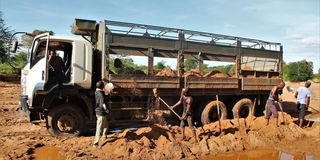Illegal sand harvesting ravages Kitui rivers

Sand miners load a truck at River Kivou in Kitui County on May 10, 2023. Kitui Governor Julius Malombe has moved to regulate sand harvesting.
What you need to know:
- At River Tiva’s riverbed, dozens of young men equipped with spade feverishly dig and haul sand away.
- The scene is an eyesore and an environmental disaster in the making.
Despite the recent implementation of a law regulating sand harvesting in Kitui County, the illegal activity is still rampant across the region.
A spot check by Climate Action reveals that numerous trucks are still driving in and out of a section of River Tiva along the Kitui-Machakos Road.
Even worse, this is not the only river affected by uncontrolled sand mining activities. Over the years, many rivers in the region have experienced massive degradation due to unregulated sand harvesting.
At River Tiva’s riverbed, dozens of young men equipped with spade feverishly dig and haul sand away. The scene is an eyesore and an environmental disaster in the making.

Patrick Kimanzi shows a shallow well damaged by wanton sand mining and expansion of a section of River Kivou in Kitui County on March 16, 2024. The county government has enacted a law to regulate the lucrative sand industry.
"We are glad the government has not banned sand harvesting. This is our only source of livelihood," a middle-aged man who identified himself only as Tom tells Climate Action. Tiva has changed course in recent years. It initially passed over there," Tom adds, pointing at a section of the riverbed where a team of young men are loading sand onto a truck.
The situation in the semi-arid Mwingi region is similar. Acres of farmlands have been eroded by River Kivou over the years. The river is the primary source of sand that is often used for construction in Thika and Nairobi.
The impact of sand harvesting on the environment is evident as sand trucks navigate damaged shallow wells in the middle of the river channel as they transport sand nuggets.
"This section of River Kivou channel has expanded over the years to occupy a huge strip of what used to be a mango orchard. The original channel is becoming deeper and deeper," says Patrick Kimanzi, a farmer and a village elder at Kivou Central Village.
He is among the oldest beneficiaries of the sand mining gravy train. Environmentalists have linked the expansion of river channels and the change of river courses to uncontrolled sand harvesting.
According to Halinishi Yusuf, a sand expert and trustee at Sand Dams Worldwide, a United Kingdom-based charity that advocates the construction of sand dams, this issue can be addressed by promoting the construction of sand dams.
These dams are designed to trap sand and sediments in a river, which serve as an armour to protect a river bed and river banks from erosion. "Sand mining removes sediments from a river channel. As a result, the water that flows through such a channel moves faster and is more veracious since it is deficient in sediments. Such water significantly affects the river morphology.
It deepens the river bed by eroding it and weakens the river banks, making them more susceptible to erosion. This way, the river channel expands, and the river can change direction depending on the geological features of the channel," Ms Yusuf tells Climate Action.
Sandy riverbeds are an essential source of water for Kitui residents. However, unregulated sand mining is becoming increasingly popular in the region, reducing rivers' ability to hold water and thus causing conflicts between sand miners and farmers.
To address this problem, Kitui Governor Julius Malombe has passed the Kitui County River Basin's Sand Utilisation and Conservation Act, 2023, which regulates the lucrative sand industry. This new law aims to end rampant sand mining and poaching.
"Kitui has recently experienced an ever-increasing demand for its naturally occurring sand owing to the county's proximity to big cities and urban centres. The end result of the unregulated sand mining activities is that the county has witnessed receding water tables, drying up of most rivers, and unchecked floods leading to destruction of property, farmlands, and crops and, in some cases, loss of human life," Dr Malombe said when he signed the sand law.
The law prohibits trucks from driving on riverbeds. Sand harvesting and transportation require a licence from the county government; failure to which an offender may be get a fine of Sh200,000, a minimum jail term of two years, or both.
The law proposes designated sand harvesting sites and aggregation yards, with only light trucks allowed to transport sand through specific routes.
Cooperative societies will be established with members drawn from the regions served by the rivers to identify sand harvesting sites, harvest sand, and transport it to the collection yards for sale.
The Kitui sand law details an ambitious plan to rehabilitate rivers damaged by decades of wanton sand harvesting by building sand dams. It also borrowed heavily from the Makueni County government, which enacted a similar law nine years ago. Environmentalists have hailed the law for restoring depleted rivers.
The law has an elaborate formula for sharing the money realised from the sale of sand. It has created the Makueni County Sand Conservation and Utilisation Authority, a parastatal tasked with regulating the sand industry.



